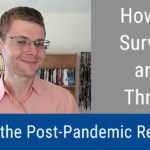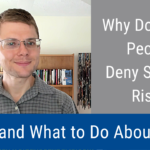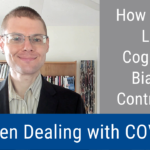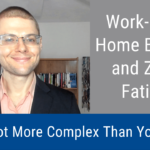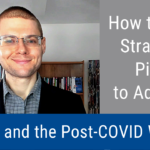Gleb Tsipursky
How to Cope With Depression in the Post-Pandemic Recovery
To cope with depression in the post-pandemic recovery, find new ways of fulfilling your needs for exploration, love, and meaning and purpose.
How to Defeat Work-From-Home Burnout and Zoom Fatigue
Protect your company from the disastrous effects of work-from-home burnout and Zoom fatigue by a strategic shift toward virtual work being the new normal rather than an emergency measure
How to Survive and Thrive During the Post-Pandemic Recovery (Video and Podcast)
As we continue to emerge from the COVID-19 pandemic and adjust to the post-pandemic world, it's important to identify and meet your basic needs. That's the key take-away message of this episode of the Wise Decision Maker Show, which describes how to survive and thrive during the post-pandemic recovery.
Why Do Smart People Deny Serious Risks (and What to Do About It) (Video...
When dealing with smart people who deny serious risks, focus on their emotions, help them acknowledge reality, and positively reinforce their acceptance of risks. That's the key take-away message of this episode of the Wise Decision Maker Show, which describes why smart people deny serious risks and what to do about it.
How Not to Let Cognitive Biases Control Us When Dealing with COVID (Video and...
Protect yourself from poor COVID-related decisions by being aware of cognitive biases - particularly the normalcy bias, attentional bias, and planning fallacy - and making strategic plans that can prevent your gut reactions from taking over. That's the key take-away message of this episode of the Wise Decision Maker Show, which describes how not to let cognitive biases control us when dealing with COVID.
How to Defeat Work-From-Home Burnout and Zoom Fatigue (Video and Podcast)
Protect your organization from the disastrous effects of work-from-home burnout and Zoom fatigue by a strategic shift toward virtual work being the new normal rather than an emergency measure. That's the key take-away message of this episode of the Wise Decision Maker Show, which describes how to defeat work-from-home burnout and zoom fatigue.
Work-From-Home Burnout and Zoom Fatigue is a Lot More Complex Than You Think (Video...
Work-from-home burnout in the pandemic can lead to serious mental health issues and lost productivity. Leaders can help their team members by identifying the root causes and making a strategic shift to a virtual work culture. That's the key take-away message of this episode of the Wise Decision Maker Show, which describes why work-from-home burnout and zoom fatigue are a lot more complex than you think.
Why Do Smart People Deny Serious Risks (and What to Do About It)
When dealing with smart people who deny serious risks, focus on their emotions, help them acknowledge reality, then positively reinforce their acceptance of risks.
Work-From-Home Burnout and Zoom Fatigue is a Lot More Complex Than You Think
Work-from-home burnout in the pandemic can lead to serious mental health issues and lost productivity. Leaders can help their team members by identifying the root causes and making a strategic shift to a virtual work culture.
How to Do a Strategic Pivot to Address COVID (Video and Podcast)
A strategic pivot will enable your company to survive and thrive during the COVID pandemic and in the post-COVID world. Start by challenging assumptions about your internal and external business model. Then, revise your strategy and determine next steps to operationalize these changes. That's the key take-away message of this episode of the Wise Decision Maker Show, which describes how to do a strategic pivot to address COVID and the post-COVID world.




